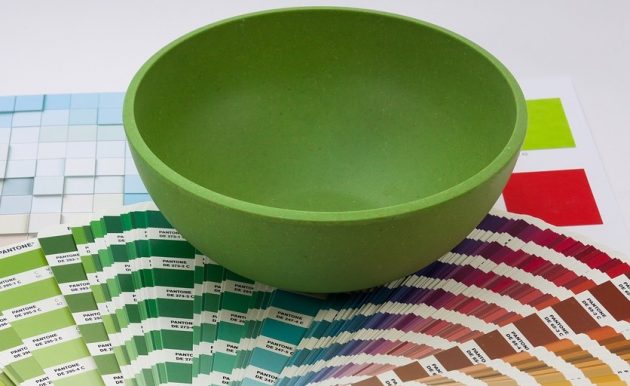Eco-friendly Tableware and Cutlery
Globally, 300 million tons of plastic are produced roughly every year and half of these are disposable! Only 10-13% of plastic items are recycled. Nature of petroleum-based disposable plastic makes it hard to recycle so new virgin materials and chemicals are added to it for the purpose of recycling. Also, there are a restricted number of items recycled plastic can be used to build. Over 8 million metric tons of plastic end up in the ocean every year. One study found that by 2050, there will be more plastic in the ocean than fish. Micro-plastics, which are small enough to enter the food chain, have been discovered to contaminate bottled water.

Statistics have shown that about 15,000 tonnes of plastic waste is generated across India daily, with some 6,000 tonnes remaining uncollected. Much of this is produced from single-use plastic, such as PET bottles. According to more current news, India’s 1.3 billion population produces 25,000 metric tons of plastic per day. Around 60% of that is recycled as per government claims but civil society groups put the figure closer to 40 %.
Hard Truth About Disposable Items
The biggest environmental impact of disposables happens before one buys the product. Disposable items are not a good environmental option. The reason? A lot of energy, as well as resources, are put into manufacturing and transporting these single-use products.
As of March 2015, all disposable dish-ware items like paper, plastic, and compostable cups, cutlery, and plates go into trash None of these can be recycled or even composted at work or at home. Even if these disposables could be recycled or composted, a majority of their environmental impact occurs upstream, in manufacturing and during transportation, before they’re even utilized (Check more here).
A Life Cycle Assessment (LCA) study was carried out in 2015 by the Pro. Mo. Group, a manufacturer of disposable plastic tableware. This study compared the environmental impact of various types of tableware in the food-service industry.
The analysis consisted of two items i.e. plates (cellulose pulp plates, disposable PP, PLA, PS, and reusable china plates) and cups (PE coated paperboard cups, disposable PP, PLA, PS, and reusable glasses).
The data was collected and analyzed by Quotasette srl. It was found that from the target life perspective, the environmental impact of the Life Cycle of polypropylene and polystyrene products, which are traditional plastic materials, is lower than the impact of polylactic acid (PLA) and cellulose pulp tableware (according to the objectives of the European Directive on waste 2008/98/CE).
Traditional reusable tableware performs better in terms of environmental impact, but for out of home food-service, computation of other variables like cost, safety, and hygiene inclines people towards disposables (Check more here).
Eco-friendly Vendors to the Rescue
Many manufacturing companies have put forward novel products in the market to end use of disposable plastic tableware and cutlery, which are continually proving to be harmful to the environment. Some of the vendors supplying products for use during picnics, functions, business meetings or other similar events, etc. are listed below:
- Vardhman Enterprises: Manufacturers and suppliers of areca plates and utensils. Situated at Holambi Kalan, Delhi. Any query is to be submitted on their website.
- Hello Polymer (India) Private Limited: Manufacturers and suppliers of eco-friendly disposable paper utensils. Situated at Tilak Nagar, Industrial Area, New Delhi. They are event and party suppliers.
- Aqua Print-O-Pak: Manufacturers and suppliers of eco-friendly disposable utensils made of bagasse and bamboo. Situated at Sonipat. They are event and party suppliers of pulp tableware products. Visit website for more information.
- Touch Wood Industries: Manufacturers and suppliers of cornstarch ware. Situated at Peeragarhi, New Delhi. Established in 2011. Eco-friendly plates, trays, boxes, containers, cutlery etc. Are manufactured by them.
- Pinnacle Packs: Manufacturers and suppliers of disposable paper crockery, color coated, custom designed tableware. Situated at IMT Manesar, Gurgaon. Supplies party items, utility dishes etc.
- Diksha Ceramics: Manufacturers and suppliers of terracotta disposable eco-friendly cutlery, bowls, crockery, ice-cream cup, kheer plates etc. Situated at Kot, Jhajjar, Haryana. Established in 2008.
- Jains India: Manufacturers and suppliers of disposable, eco-friendly, custom designed, natural zero-pollution crockery. Situated at Sanjay Place, Agra. Supplies eco-friendly spoons, plates, bowls, trays etc.
- Bio World: Manufactures and suppliers of biodegradable areca leaf plates and cups. Situated at Singampunari, Madurai. Products contain no chemicals, are human-friendly and can even be used after storing for a long time.
- Shreeji Traders: Manufacturers and suppliers of areca disposable and eco-friendly plates and bowls. Situated at Pathha Palardi, Ahmedabad. Biodegradable plates, spoons, and bowls are produced for events and parties.
- Picasso Print and Pack: Manufacturers and suppliers of eco-friendly, biodegradable, agro-based disposable utensils. Situated at Andheri, Mumbai. Established in 2000. They also supply grocery bags, kraft paper bags, cake baseboards, etc.
Modify to Survive
Over-utilization of disposable plastic items is dangerous to our environment. Therefore, care must be taken to introduce eco-friendly alternatives. The prime environmental choice is reusable tableware, even if offered to consumers for on-site usage. For disposable items, it is better to look for products made with recycled content. The more the percentage of recycled content, the better. Due to efforts put in by the governments all over the globe to promote biodegradable products, paper, cardboard, as well as plastic disposable ware with recycled content are becoming easier to find now. Keep an eye out for labels that proclaim “Made with recycled content” or “30% [or more] post-consumer recycled content.”
Author’s Bio:
Adeela Hameed is pursuing Masters in Environmental Sciences at Amity University, Noida.




Cannot stop saying many good things about eco-friendly tableware. This is really good!